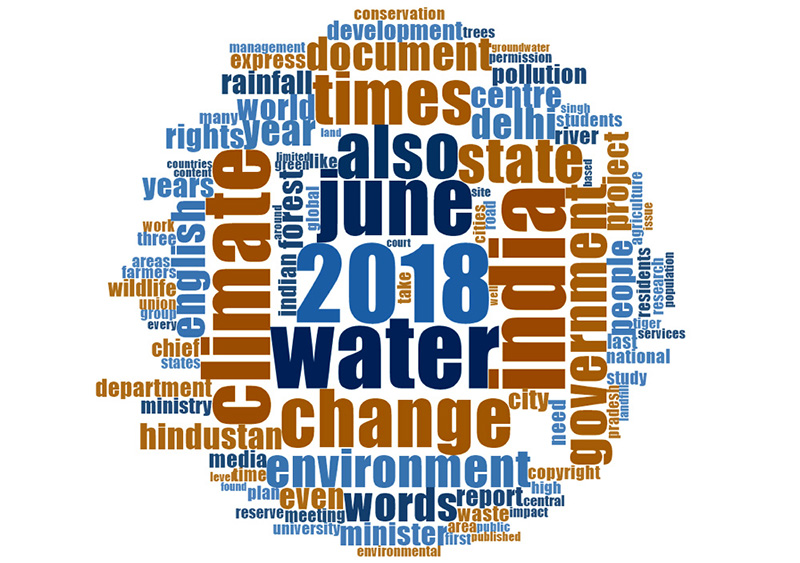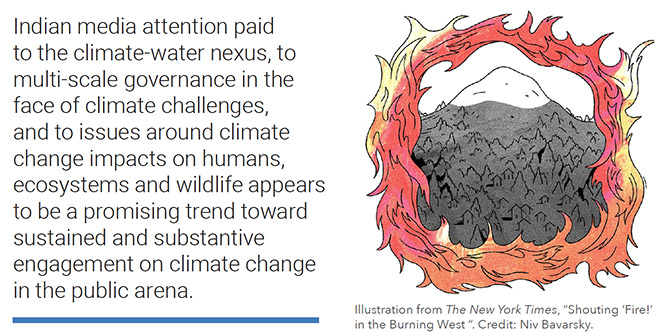Monthly Summaries
Issue 18, June 2018
[DOI]
June media attention to climate change and global warming was up 6% throughout the world from the previous month of May 2017. There were upticks in Asia (up 10%), the Middle East (up 34%), Africa (up 19%), Central/South America (up 38%), and Europe (up 12%), while holding relatively steady in Oceania. The Media and Climate Change Observatory (MeCCO) detected a decrease in coverage in North America (down 6%). However, the global numbers were down about 35% from counts a year ago (June 2017), when the high levels of coverage in June 2017 were largely attributed to reactions to United States (US) President Donald J. Trump’s withdrawal from the Paris Climate Agreement. At the country level, coverage held relatively steady from the previous month in Australia and New Zealand. Meanwhile, it went up from the previous month in India (+15%), Spain (+40%), the United Kingdom (UK) (+12%), Canada (+21%), and Germany (+56%), while it went down in the United States (-18%).
Figure 1 shows these ebbs and flows in media coverage at the global scale – organized into seven geographical regions around the world – from June 2004 through June 2018.

Figure 1. Newspaper media coverage of climate change or global warming in sixty-two sources across thirty-five countries in seven different regions around the world, from June 2004 through June 2018.
Moving to considerations of content within these searches, Figure 2 shows word frequency data at the country levels in Indian newspapers in June 2018.
 The four representative national level English language sources in India – The Times of India, Hindustan Times, The Indian Express, and The Hindu – was an illustration of a wider trend of the waning Trump influence over media coverage outside US borders. This is one indication that the influence of the ‘Trump Dump’ (where media attention that would have focused on other climate-related events and issues instead was placed on Trump-related actions (leaving many other stories untold)) has weakened outside the ‘walls’ of the US. Overall, in the Indian press, Trump was only mentioned once in the June 2018 media coverage. In May 2018, Trump was invoked 75 times in 353 articles in June (approximately 0.2 times per article on average). At first glance, Indian media attention paid to the climate-water nexus, to multi-scale governance in the face of climate challenges, and to issues around climate change impacts on humans, ecosystems and wildlife appears to be a promising trend toward sustained and substantive engagement on climate change in the public arena.
The four representative national level English language sources in India – The Times of India, Hindustan Times, The Indian Express, and The Hindu – was an illustration of a wider trend of the waning Trump influence over media coverage outside US borders. This is one indication that the influence of the ‘Trump Dump’ (where media attention that would have focused on other climate-related events and issues instead was placed on Trump-related actions (leaving many other stories untold)) has weakened outside the ‘walls’ of the US. Overall, in the Indian press, Trump was only mentioned once in the June 2018 media coverage. In May 2018, Trump was invoked 75 times in 353 articles in June (approximately 0.2 times per article on average). At first glance, Indian media attention paid to the climate-water nexus, to multi-scale governance in the face of climate challenges, and to issues around climate change impacts on humans, ecosystems and wildlife appears to be a promising trend toward sustained and substantive engagement on climate change in the public arena.
Figure 2. A word cloud showing frequency of words (4 letters or more) invoked in media coverage of climate change or global warming in Indian newspapers in June 2018.
In June 2018, there were many stories that focused primarily on political dimensions of climate change. For example, asset managers have taken up strong stances in Europe to vote against reappointing leadership at firms that have not taken action on climate change. Journalist Katherine Griffin from The Times (UK) reported that Legal & General Investment Management “has taken action against companies worldwide that it believes are not fighting climate change, in one of the most interventionist policies by an investment house”. This manager of people’s savings and investments announced plans to sell shares from eight offending firms, including Dominion Energy and Occidental Petroleum.
Across the globe in June there were a range of stories that intersected with the cultural arena. For example, in mid-June Pope Francis convened a meeting of oil and gas titans – including chairmen and chief executives of ExxonMobil and British Petroleum – for a two-day conference where he urged these leaders to become advocates for the emergent global energy transition. Coverage was widespread, including reporting by Bradley Olson and Francis X. Rocca at The Wall Street Journal who wrote that Pope Francis exclaimed, “Civilization requires energy, but energy use must not destroy civilization!”.
In June, coverage relating primarily to ecological and meteorological issues garnered attention. There were a number of stories about extreme weather events around the world. For example, Northern Hemisphere wildfires captured a great deal of media attention in June. The New York Times opinion writer Sarah Vowell commented from Bozeman, Montana in the US that “there are no longer four seasons, only two: winder and wildfire”. In typically colder climes, many media accounts covered how the rate of Antarctic ice melt has tripled over the past decade and is now raising sea levels half a millimeter each year. This ecological/meteorological issue was documented by a study by a team of researchers from the ice sheet mass balance inter-comparison exercise (IMBIE) published in the journal Nature. These researchers found that 40% of the Antarctic ice loss since 1992 actually melted between 2012 and 2017, and this translates to approximately 6 inches of average global sea-level rise by 2100. Journalist Doyle Rice from USA Today reported that “the total is equivalent to over 4 quintillion gallons of water added to the world's oceans, making Antarctica's melting ice sheets one of the largest contributors to rising sea levels. That amount of water is enough to fill over a billion swimming pools and cover Texas to a depth of nearly 13 feet.” Journalist Kendra Pierre-Louis from The New York Times noted that “between 60% and 90% of the world’s freshwater is frozen in the ice sheets of Antarctica, a continent roughly the size of the United States and Mexico combined”.
Media accounts also focused on primarily scientific dimensions of climate change and global warming. For instance, an influential study by Jean-Francois Mercure and colleague in the journal Nature Climate Change found that the threat of obsolete carbon assets held by carbon-based industry entities has reached a crisis point. The authors attribute these acute threats to burgeoning mode-switching to renewable energy sources along with increasing investments in low-carbon technologies. This somewhat quiet crisis to date has been dubbed as a ‘carbon bubble’ in the market, where carbon-based energy prices exceed their value because actual demand for fossil fuels could quickly diminish and carbon-based companies would then be forced to strand their assets and face crippling costs without returns. The Guardian journalist Fiona Harvey reported that, “Plunging prices for renewable energy and rapidly increasing investment in low-carbon technologies could leave fossil fuel companies with trillions in stranded assets and spark a global financial crisis”. Another study in June that garnered considerable mediate attention came from the journal Nature by James Kossin from the National Oceanic and Atmospheric Administration (NOAA). He found that hurricanes and typhoons are moving 10% more slowly between 1949 and 2016, allowing them to do more damage over a given area. In one media report by journalist Amin Khan at the Los Angeles Times, she wrote that the findings “describe a clear link between global warming and the behavior of these severe storms – with potentially devastating consequences for the people that live near them”. At the end of June, a data release from the World Resources Institute revealed that rates of tropical deforestation jeopardized the achievement of climate mitigation and adaptation goals. Using satellite data to survey forest cover around the world, their analyses found that in 2017 tropical forests lost an area the size of Bangladesh, and this rate of deforestation is the equivalent of approximately forty soccer pitches worth of trees disappearing each minute. Journalist Sasha Ingber from US National Public Radio reported that “The report presents a bleak picture: Some areas are experiencing prolonged loss of lush forest, while new areas are becoming hot spots”.
Yes, June 1 marked the one-year anniversary from the Trump Administration withdrawal from the Paris Agreement. Onward we go into the rest of our lives.

